We test and review fitness products based on an independent, multi-point methodology. If you use our links to purchase something, we may earn a commission. Read our disclosures.
Can you imagine being involved in over 300 critical roles across multiple departments around the clock? *Google searches “the strongest pre-workout”…*
Magnesium, an essential mineral, helps carry out 300+ processes throughout the entire body: it helps your muscles contract, your heart maintain a normal rhythm, and so much more. Despite this, over half of the U.S. population is estimated not to get enough magnesium in their diets, according to a 2017 review1.
At GGR, we want you to fully experience all that magnesium can do from head-to-toe. So, our expert nutrition team rounded up and reviewed the best magnesium supplement options, thoroughly testing and scoring 14 different options. We’ve chosen our top picks to help you reclaim those 300+ processes magnesium helps with!
Medical disclaimer: This article is intended for educational and informational purposes only. It is not intended as a substitute for medical advice. For health advice, contact a licensed healthcare provider.
Best Magnesium Supplement
- Best Overall Magnesium Supplement: Transparent Labs Magnesium Bisglycinate
- Best Magnesium Supplement for Athletes: Legion Sucrosomial Magnesium
- Best High-Dose Magnesium Supplement: LifeForce Magnesium
- Best Magnesium Supplement for Brain Health: Double Wood Magnesium L-Threonate
- Best Budget Magnesium Supplement: Nature Made Magnesium Glycinate
- Best Magnesium Supplement for Constipation: NOW Magnesium Citrate
- Best Magnesium for Migraines: Nature Made Magnesium Oxide
- Best Powder Magnesium Supplement: Thorne Magnesium Bisglycinate
- Best Magnesium Complex: Klaire Labs Mag Complete
- Best Gummy Magnesium Supplement: Trace Minerals Magnesium Gummy
- Best Magnesium Supplement for Stress: Natural Calm
Uncapping the Truth: What is Magnesium
Before diving into our top magnesium supplements, let’s uncap what the essential mineral is so you can better understand its importance. As the National Institutes of Health (NIH) tells us, magnesium is involved in over 300 cellular processes in the body, which alone signals just how important it is.
While we’ll dive deeper into the benefits of magnesium throughout and compile them near the end (so be sure to stick with us!), it’s involved in energy production, protein synthesis, muscle and nerve function, blood glucose control, and infinitely-ish more.
Despite its critical importance, magnesium has recently been named “the forgotten electrolyte2” because it often doesn’t receive attention like other electrolytes like sodium, potassium, and calcium. However, magnesium is still a key component in some of the best electrolyte drinks, although it’s found in other sources as well.
High Magnesium Sources, Yet Low Magnesium Intakes
Magnesium is naturally found in various food sources, including spinach, nuts, seeds, legumes, and whole grains. And in general, foods rich in dietary fiber (found in most plants) tend to provide magnesium.
But like dietary fiber intake, Americans tend to fall shy of the recommended magnesium intake. The 2017 review1 estimates that 56 to 68% of Americans do not have enough magnesium in their daily diet.
How could this be? Many factors are at play, but diets rich in ultra-processed foods contain diminished magnesium levels. Common dietary staples in the Westernized diet contribute less than 20% of daily magnesium requirements.
Interestingly, too, vitamin D deficiency can reduce the absorption of magnesium. Alas, a deficiency of the sunshine vitamin is also on the rise—so one of the best vitamin D supplements may help.
Speaking of supplements, magnesium also comes in supplemental form often on its own, in the best multivitamins for men and women, or another elixir blend. There are many forms of supplemental magnesium—like magnesium glycinate, magnesium oxide, and magnesium oxide—that each comes with its own benefits and potential side effects, which we’ll touch upon.
Of course, we always encourage eating more wholesome, nutrient-rich foods to lower deficiency risks and optimize your health. But we likewise understand supplements can and do have their time and place to fill in any nutritional gaps, and that is exactly why we want to share our top magnesium supplements with you and how the various forms could enrich your health.
Best Magnesium Supplement Overall: Transparent Labs Magnesium Bisglycinate
Good for: Enhancing your daily magnesium intake with high-quality, third-party tested capsules
Best Overall
Transparent Labs Magnesium Bisglycinate
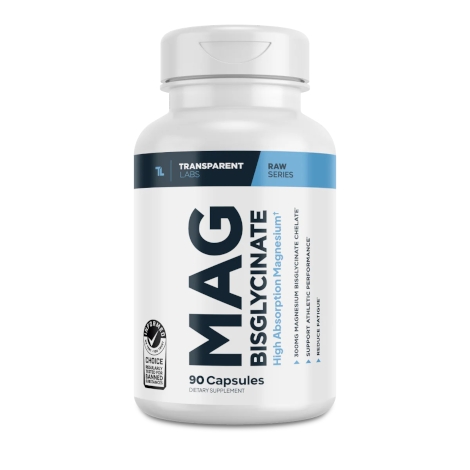
Product Highlights
- 3 tablets provides 300 g of magnesium bisglycinate
- Transparent list of ingredients
- Reportedly high bioavailability
- Benefits include improved sleep, recovery, and energy
- Vegan-friendly
Pros & Cons
Pros
- Bioavailable form of magnesium
- Transparent Labs claims it is not a laxative
- Relatively affordable
- Most users experienced the advertised benefits (sleep, recovery, energy)
Cons
- Some users didn’t like the inclusion of silicone dioxide
Bottom Line
Transparent Labs' Magnesium Bisglycinate tablets provide 300 grams of reportedly highly bioavailable, non-laxative magnesium supplement intended to improve sleep, recovery, and energy levels. As a vegan-friendly product, this affordable supplement receives raves reviews. While the vast majority of users report very positive benefits when taking this magnesium, there are a few outliers who did not appreciate the inclusion of silicone dioxide.
Transparent Labs provides high-quality products and full transparency about them, its single-ingredient magnesium supplement included. As our best magnesium supplement overall, let’s see what this single-ingredient magnesium supplement is all about.
Each three-capsule serving provides 300 milligrams of magnesium bisglycinate chelate, a combo of magnesium and the amino acid glycine. Also known as magnesium glycinate and chelated magnesium, magnesium bisglycinate provides great absorbability with fewer side effects—like diarrhea and abdominal cramping—compared to other forms of magnesium.
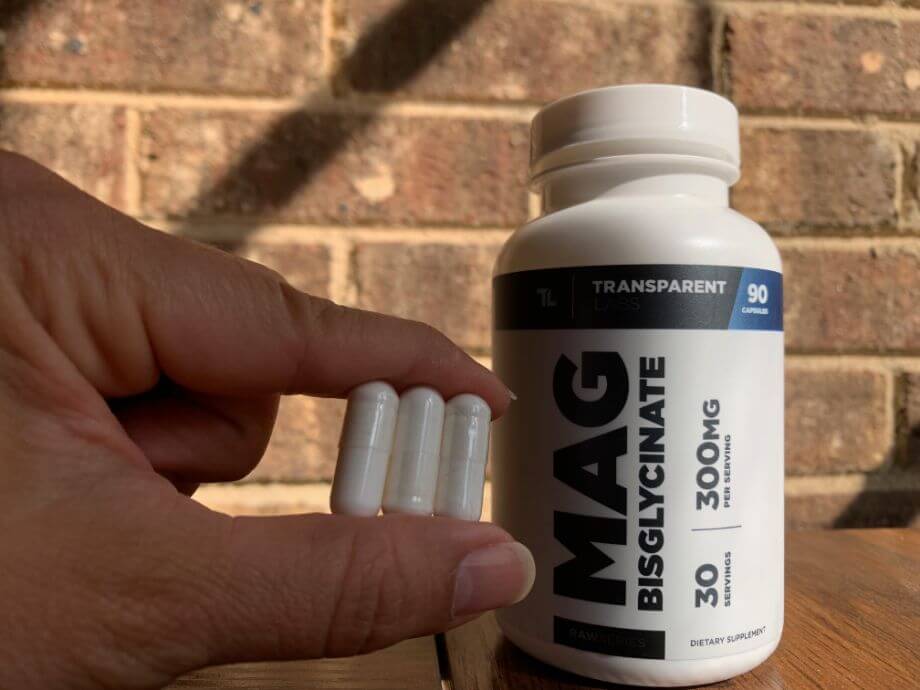
GGR head of content Kate Meier tested Transparent Labs’ magnesium out, and said the capsules are quite large—and you have to take three per serving. Keep that in mind if you don’t like swallowing pills.
While we cover dosing in full below, how much supplemental magnesium you get varies based on many factors—like the intended use and the amount of magnesium you consume from food sources. But to provide context for Transparent Lab’s 300-milligram dose, and the other options ahead, the Daily Value (DV) for magnesium is 420 milligrams daily for an adult male and 320 milligrams for an adult female.
Like all Transparent Lab products, its magnesium supplement is free of artificial ingredients and third-party tested. You can even view its Certificate of Analysis (COA), aligning perfectly with the brand’s commitment to transparency.
| Type | Capsules |
| Form of Magnesium | Magnesium Bisglycinate |
| Magnesium Per Serving | 300 mg (71% DV) |
| Dosing Instructions | Take 3 capsules with or without a meal once or twice daily |
| Cost | $16.99/30 servings = $0.57/serving |
Best Magnesium Supplement for Athletes: Legion Sucrosomial Magnesium
Good for: Supporting your daily fitness, health, and magnesium goals
Best for Athletes
Legion Sucrosomial Magnesium
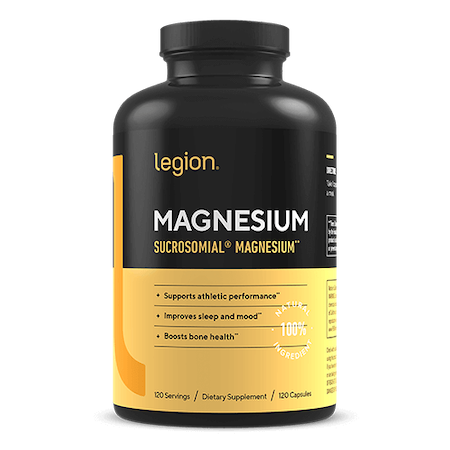
Product Highlights
- Magnesium supplement designed for athletes
- Supports athletic performance, mood, sleep, bone, and heart health
- 150 mg of magnesium per 1-capsule serving
- NSF-certified
Pros & Cons
Pros
- Affordable at $0.25 per serving
- No return necessary money-back guarantee
- Third-party tested
Cons
- Dosage may be low depending on what your goals are
Bottom Line
Committed to providing clinically effective doses and total formulation transparency, Legion is a supplement brand we trust and regularly recommend. And supposedly providing a scientifically proven form of magnesium that supports athletic performance, amongst other benefits, Legion Sucrosomial Magnesium could be a great option for athletes and health enthusiasts alike.
If you’re wondering what “Sucrosominal Magnesium” is all about, it’s a patented form of magnesium oxide protected by a sucrosomial complex trademarked by Maypro. The company website tells us that phospholipids and sucrose esters cover magnesium to enhance absorption—and apparently absorb faster with 20 percent higher bioavailability than magnesium citrate. A 2018 study3 further suggests that sucrosomial magnesium leads to an increased bioavailability of magnesium compared to other forms like magnesium oxide.
And regarding those athletic benefits, out of all of the minerals, magnesium (and iron) has the strongest quality evidence4 for improving athletic and muscle performance. But given that magnesium helps with energy metabolism and muscle function, it’s unsurprising that it may support athletic endeavors.
Specific to magnesium oxide, there’s some research5 hinting that supplementing with it for 12 weeks seems to improve physical performance in healthy older women. Overall, because adequate magnesium levels6 are positively linked to muscle performance and cardiorespiratory health during aerobic exercise, adequate intake should be emphasized over the form.
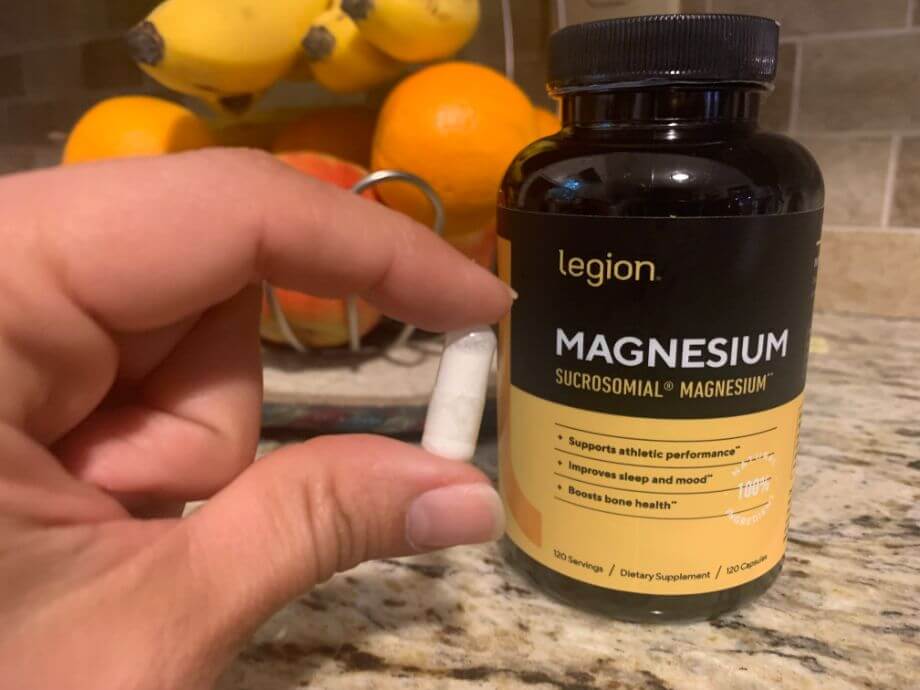
Like all Legion products, we appreciate that the magnesium supplement is free of artificial ingredients. Oh, and Legion offers a “no return necessary” money-back guarantee and will give you a full refund on the spot—no forms or return necessary!
And as the magnesium-rich cherry on top, Legion products are also made in U.S.-based, National Sanitation Foundation (NSF)-certified, Food and Drug Administration (FDA)-inspected, and Good Manufacturing Practices (GMP)-compliant facilities. They also undergo third-party testing to ensure it meets FDA purity standards, and you can even view each product’s COA on the Sucrosomial Magnesium product page.
GGR head of content Kate Meier tested Legion’s magnesium and said the pill was easy to swallow—she appreciated the serving size is only one capsule, too. She regularly takes magnesium and didn’t notice any interruption or side effects when swapping this product in, which is a good thing.
| Type | Capsules |
| Form of magnesium | Sucrosomial magnesium (magnesium oxide) |
| Magnesium per serving | 150 mg (36% DV) |
| Dosing instructions | Instructions are not denoted on the product page, although a serving size is 1 capsule |
| Cost | $29.99/120 servings = $0.25 |
Best High-Dose Magnesium Supplement: LifeForce Magnesium
Good for: Those who need a high magnesium dose to treat anxiety-related symptoms
Best High-Dose
LifeForce Magnesium
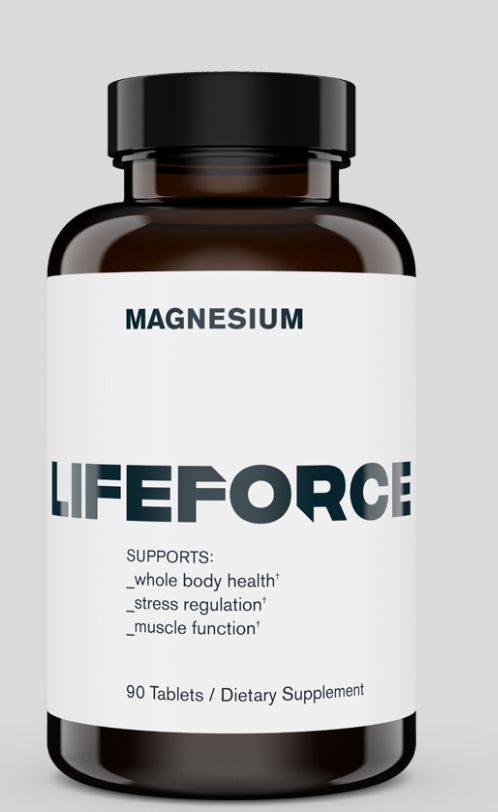
Product Highlights
- 315 mg of magnesium per serving
- High dose
- Mix of magnesium sources
- 30 servings per container
- Subscription options available
Pros & Cons
Pros
- High dose
- Mix of magnesium sources
- Subscription options available
Cons
- Pills are chalky and tough to swallow
- Pricey ($2 per serving)
- Not the best for heart-related issues
Bottom Line
LifeForce Magnesium is a high-dose magnesium supplement that may help alleviate anxiety-related symptoms.
If you’re looking for the biggest bang for your buck when it comes to dosage, LifeForce Magnesium contains 315 milligrams of magnesium per three-tablet serving. Registered dietitian Laila Ouldibbat says that amount is perfect for anyone looking to take magnesium to alleviate stress or anxiety-related symptoms.
“Glad it falls within the recommended daily allowance and ‘stress dose,'” Laila says. A 2017 review of studies on magnesium found supplementing with the micronutrient reduced stress-related symptoms such as mild anxiousness, premenstrual syndrome (PMS), and hypertension. There were no improvements in postpartum anxiety, the study found.
Laila warns, however, that users should know how much magnesium they’re getting from their food in addition to this magnesium supplement. The average adult should limit themselves to 350 milligrams of magnesium per day—not far from the 315 mg dose. Excess magnesium could lead to an upset gastro-intestinal tract.
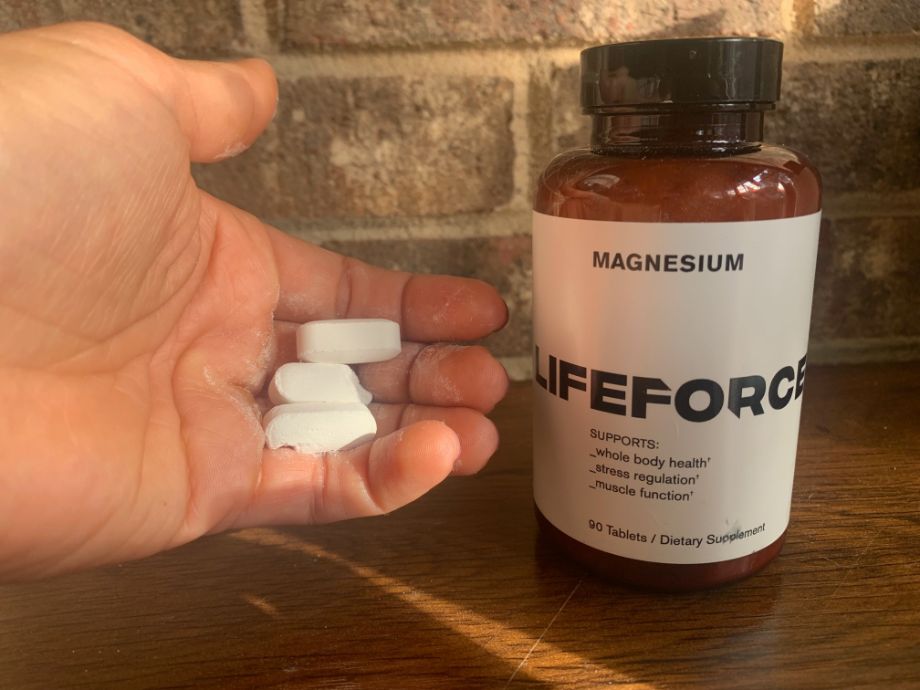
Kate Meier, GGR head of content and expert product tester, didn’t notice much of a change in her mood during her testing. She added that the tablets were large and “very chalky.”
“I couldn’t take all three at once,” Kate says.
| Type | Tablets |
| Form of magnesium | Magnesium bis-glycinate chelate, magnesium L-threonate, di-magnesium malate, magnesium n-acetyltaurinate |
| Magnesium per serving | 315 mg |
| Dosing instructions | 3 tablets |
| Cost | $60/30 servings = $2/serving |
Best Magnesium Supplement for Brain Health: Double Wood Magnesium L-Threonate
Good for: Boosting magnesium levels and supporting an intelligent noggin
Best for Brain Health
Double Wood Magnesium Threonate
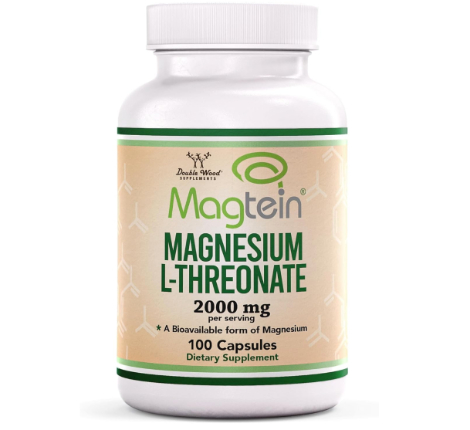
Product Highlights
- 144 mg of magnesium threonate (Magtein) per serving
- Uses a highly bioavailable form of magnesium
- Third-party tested
- COAs and third-party testing results are available on the product website
Pros & Cons
Pros
- Uses a highly bioavailable form of magnesium
- Third-party tested
- COAs available
Cons
- Expensive for magnesium
- Only 25 servings for bottle
- Each serving is 4 capsules
Bottom Line
Double Wood Magnesium Threonate provides a high-quality source of magnesium, and it's third-party tested with testing results and COAs available on the website. Even though each serving size is four capsules, they're relatively small and easy to swallow.
A serving of Double Wood Magnesium L-Threonate provides 144 milligrams of magnesium sourced from Magtein, the patented name for magnesium L-threonate (MgT). According to Magceutics, the company that owns the Magtein patent, magnesium L-threonate is a mineral salt of magnesium, a brain-bioavailable form of magnesium that is typically well-tolerated with no significant adverse effects. This type of magnesium is often considered the best for brain health.
Most of the research on the effects of magnesium L-threonate are animal studies, including these 201018 and 2019 studies19 that imply MgT improves brain-related functions like learning and memory. Fast forward to 2022, a study20 suggests that Magtein, paired with vitamins C and D, may improve memory and cognition in healthy adults.
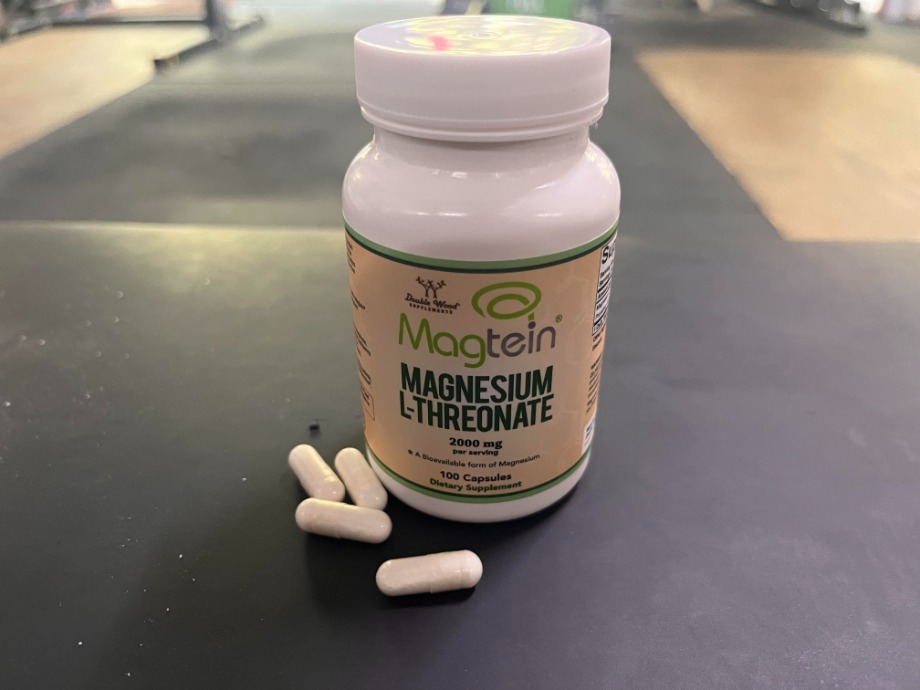
Our tester didn’t notice any particularly strong benefits from using Double Wood Magnesium L-Threonate, but mentioned they were pleasantly surprised by the capsule size, rating the swallowability a 5 out of 5. They said, “The serving size is four pills that are all roughly the size of a quarter. I was able to get them down in one swig. There’s no taste either, which helps with getting them down.”
While the front of the bottle says 2,000 milligrams per serving, the nutrition label clarifies that this provides 144 milligrams of elemental magnesium, which is the total amount of active magnesium in the 2,000 milligrams of magnesium salt.
The capsules are manufactured in the United States, and are gluten-free, soy-free, and non-GMO. Double Wood also uses third-party testing for these capsules, and you can see the Certificate of Analysis and third-party testing results on the company website.
| Type | Capsules |
| Form of magnesium | Magtein magnesium l-threonate |
| Magnesium per serving | 144 mg (34% DV) |
| Dosing instructions | Take up to 4 capsules per day, 2 in the morning and 2 in the evening |
| Cost | $24.95/25 servings = $1.20/serving |
Best Budget Magnesium Supplement: Nature Made Magnesium Glycinate
Good for: Supplementing with a high absorbable magnesium at a lower cost
Best Budget
Nature Made Magnesium Glycinate
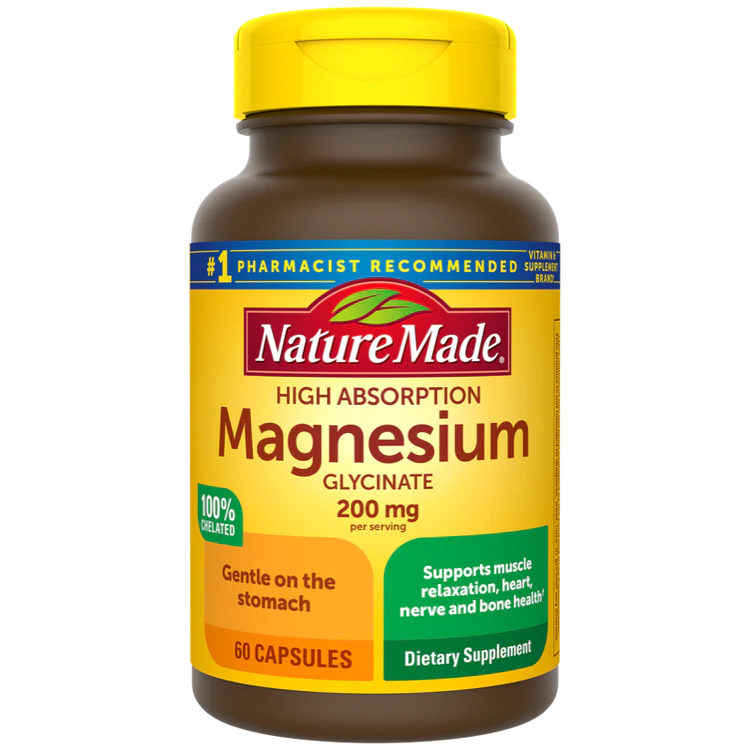
Product Highlights
- 2 capsules provide 200 mg or chelated magnesium glycinate
- Claimed to have high absorption
- Chelated to reduce and prevent digestion issues
- Formulated to promote muscle relaxation and heart, nerve, and bone health
Pros & Cons
Pros
- Many users report it is easy to digest
- Chelated magnesium
- Established brand
- Gluten-free
Cons
- Pill size is too large for some
Bottom Line
Formulated with 200 milligrams of chelated magnesium glycinate, two capsules of Nature Made Magnesium Glycinate capsules are claimed to promote muscle relaxation and heart, nerve, and bone health. According to Nature Made, the chelation process is intended to reduce or prevent digestion issues. If you struggle swallowing large pills, you should note that there are a few consumers who found the pill size to be too large.
While great for any budget, Nature Made Magnesium Glycinate is far from low-quality! And for extra savings, and longer-term use, we recommend snagging the 180-count filled with 90 servings—this amounts to about $0.57 per day versus about $0.70 per day for the 60-count, 30-day supply.
Your health-devoted $0.55 per day provides 200 milligrams of highly absorbable magnesium glycinate to support a healthy heart, bones, and nervous system. This form of magnesium may also be gentler on the stomach than others like magnesium oxide.
GGR performance editor Anthony O’Reilly tried these Nature Made tablets and said for the price, you can’t beat them. “Did it help me fall asleep? Yes, but not to the point where I’d take them every night,” he says. “I do take them now if I need to fall asleep quickly, such as the night before a flight or something like that.”
Although Nature Made prides itself on being the first vitamin brand to earn United States Pharmacopeia (USP) verification on many of its products, there’s no sign online that its magnesium supplement is. But we like that it’s free of synthetic dyes, artificial flavors, and gluten.
| Type | Capsules |
| Form of magnesium | Magnesium bisglycinate |
| Magnesium per serving | 200 mg (48% DV) |
| Dosing instructions | Take 2 capsules daily with water and a meal |
| Cost | $50.97/90 servings = $0.57/serving |
Best Magnesium Supplement for Constipation: NOW Magnesium Citrate
Good for: Promoting regularity one magnesium capsule at a time
Best for Constipation
NOW Magnesium Capsules
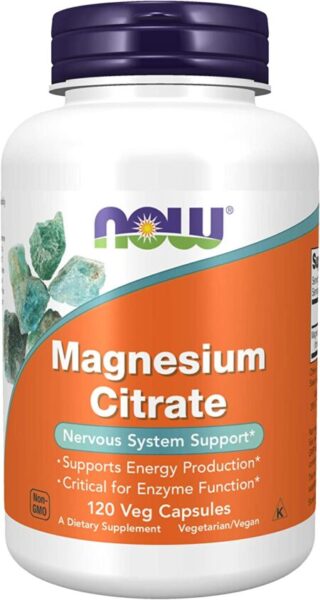
Product Highlights
- 1 pill provides 400 mg magnesium
- Claimed to be a required cofactor for 300 enzymes
- Stated to be critical for energy production and metabolism
- Reportedly aids nerve impulse transmission and bone mineralization
- GMP quality–assured, NPA A-rated
Pros & Cons
Pros
- Several reports of decreased restless legs
- Many found it promotes sleep
- Easy-to-swallow
- Relatively affordable
- Kosher-, vegan-, and soy-free
- Keto, non-GMO, and halal
Cons
- May have a laxative affect
- Reports of receiving fewer pills in bottle than advertised
Bottom Line
NOW Magnesium pills each contain 400 milligrams of magnesium, which NOW claims to be a necessary cofactor for 300 enzymes and critical for energy production, metabolism, nerve impulse transmission, and bone mineralization. This supplement is GMP quality–assured and NPA A-rated. However, there are some who experienced laxative effects when taking this.
Google search “magnesium functions,” and you’ll find roles related to helping with muscle and nerve function, managing blood sugar levels, regulating blood pressure, and supporting immune health, amongst others. Search for “magnesium citrate,” it makes sense why NOW Magnesium Citrate is crowned to send you back to your porcelain throne.
NOW provides 400 milligrams of magnesium citrate, a form of magnesium well known for its laxative effects. It works by increasing fluid in the small intestine, thus softening the stool and relieving constipation, often within 30 minutes to 6 hours.
GGR staff writer Lauren Strong says this magnesium was recommended to her for pelvic floor health, as well as regularity, by her physical therapist. “I like that the one pill has a 400-milligram dose, which is exactly how much I’m supposed to take.”
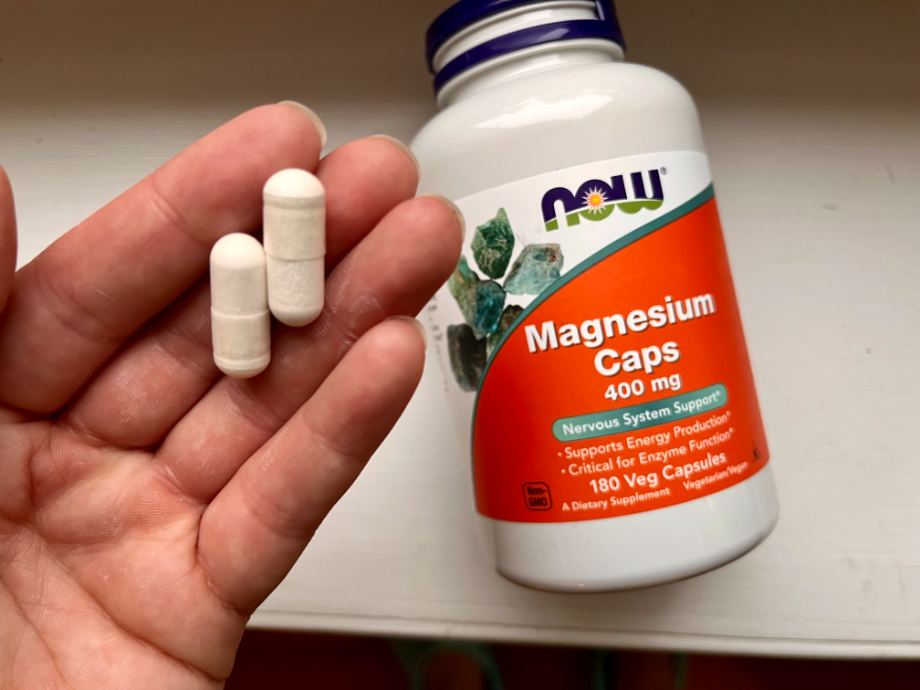
Early 1990 research11 shows that magnesium citrate is more soluble and bioavailable than magnesium oxide, another form of magnesium commonly used to treat constipation. Newer 2017 research12 confirms and supports the former data, suggesting magnesium citrate may be more suitable than magnesium oxide for optimizing dietary magnesium intake.
To totally support your gut health, we recommend checking out the best prebiotic, best probiotic, and best fiber supplements (especially if you aren’t getting enough of these in your daily diet).
But back to the NOW, its magnesium citrate is not manufactured with wheat, gluten, soy, egg, fish, shellfish, and tree nuts. However, it’s made in a GMP facility (great to see!) that processes common food allergens (so please select accordingly).
| Type | Capsules |
| Form of magnesium | Magnesium citrate |
| Magnesium per serving | 400 mg (95% DV) |
| Dosing instructions | Take 3 capsules daily, preferably in divided doses, with food |
| Cost | $21.45/80 servings = $0.27/serving |
Best Magnesium Supplement for Migraines: Nature Made Magnesium Oxide
Good for: Alleviating migraines and increasing magnesium intake with one daily capsule
Best Magnesium Supplement for Migraines
Nature Made Magnesium Oxide
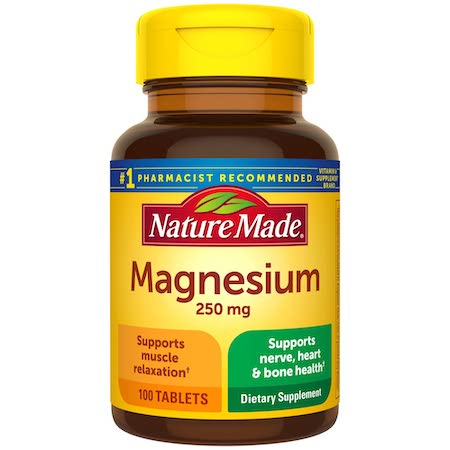
Product Highlights
- 250-mg tablets of magnesium oxide
- Supports muscle relaxation, nerve, heart, and bone health
- Magnesium oxide supposed to help specifically with migraines
- 100 tablets per bottle
Pros & Cons
Pros
- Very affordable
- Can help with headaches
Cons
- Can have a laxative effect
- Some reviewers felt like the capsules were too large or awkwardly sized
Bottom Line
Nature Made magnesium oxide tablets provide 250 milligrams per capsule and can support muscle relaxation, nerve, heart, and bone health. Magnesium oxide specifically can help manage headaches as well.
Did you know magnesium can help with migraines? According to the American Migraine Foundation, a 400 to 600-milligram dose of magnesium oxide may prevent migraines. A recent 2021 study13 further supports that magnesium oxide may be as effective as valproate sodium14, a medication for migraines.
Nature Made provides 400 milligrams of magnesium oxide per 1 soft gel serving, aligning with the 400 to 600 milligram dose for migraine. Beyond managing and preventing migraines, the Nature Made magnesium supplement is formulated to support bone, nerve, and heart health.
It’s important to note that magnesium oxide can have a strong laxative effect and is the reason why it’s often used to treat constipation.
GGR senior editor Nicole Davis has been supplementing with Nature Made’s magnesium oxide to help with headaches during pregnancy, and has noticed a huge improvement in her symptoms—consider her sold!
And as previously mentioned, many of Nature Made’s products are third-party tested and certified through USP. But like its magnesium glycinate supplement, there’s no indication of USP certification on magnesium oxide’s product page.
| Type | Tablets |
| Form of magnesium | Magnesium oxide |
| Magnesium per serving | 400 mg (95% DV) |
| Dosing instructions | Take 1 softgel daily with water and a meal |
| Cost | $13.99/60 servings = $0.20/serving |
Best Powder Magnesium Supplement: Thorne Magnesium Bisglycinate
Good for: Mixing and sipping a lightly-sweetened, third-party tested magnesium powder
Best Powder
Thorne Magnesium Bisglycinate
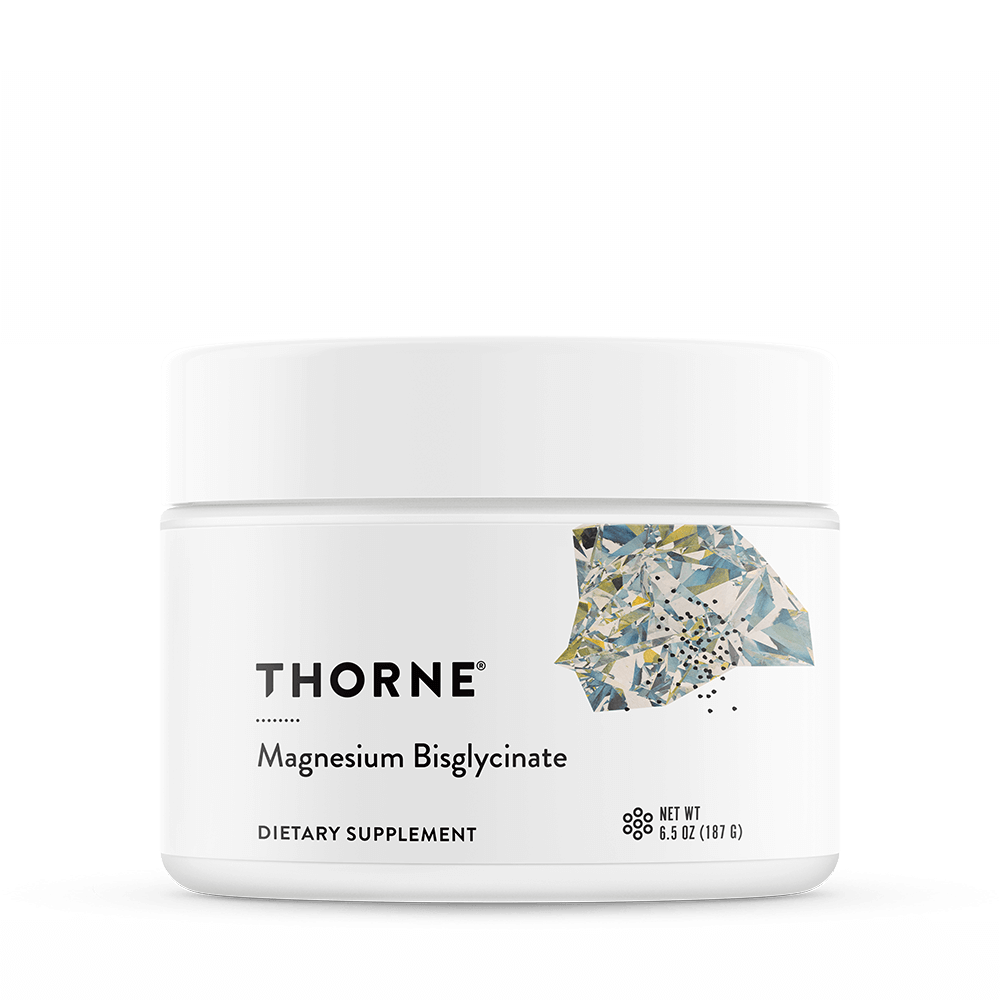
Product Highlights
- Lightly sweetened powder providing 200 mg of magnesium bisglycinate
- Formulated to promote sleep and muscle relaxation
- NSF-certified
- Claimed to support muscles, tendons, bone, heart, vascular, and foundational health
- Stated to be well-tolerated and well-absorbed
Pros & Cons
Pros
- Mixes well
- Clean ingredients
- Naturally sweetened with monk fruit
- Users report positive effects after taking
Cons
- Sweeter taste is not for everyone
Bottom Line
Lightly sweetened with monk fruit, Thorne’s Magnesium Bisglycinate delivers 200 milligrams of magnesium bisglycinate per scoop. According to Thorne, this form of magnesium is both well-tolerated and well-absorbed. Formulated to promote sleep and muscle relaxation, Thorne also claims it will support muscle, tendons, bone, heart, vascular, and foundational health.
Thorne Research is known for its high-quality ingredients in clinically effective doses, even collaborating with Mayo Clinic, and that’s one of the reasons why we awarded it the best iron supplement overall. All this to say, it’s really not so surprising that its magnesium powder landed on our top picks.
Formulated to promote restful sleep and muscle relaxation, one scoop of the taste-free powder provides 200 milligrams of magnesium bisglycinate. While the powder does not indicate a specific flavor, it is sweetened with the natural sweetener monk fruit. It’s also free from gluten, added sugars, thickeners, and artificial flavors and colors.
Thorne’s facilities are verified by multiple international third-party organizations, including Australia’s Therapeutic Goods Administration, a regulatory agency run by the Australian Government Department of Health. Thorne supplements are also NSF Certified for Sport, meaning they have been tested for and are free of over 200 substances banned by many major sports organizations.
| Type | Powder |
| Form of Magnesium | Magnesium bisglycinate |
| Magnesium Per Serving | 200 mg (48% DV) |
| Dosing Instructions | Instructions are not denoted on the product page, although a serving size is 1 scoop |
| Cost | $48.00/60 servings = $0.80/serving |
Best Magnesium Complex: Klaire Labs Mag Complete
Good for: Obtaining multiple forms of magnesium with a single goal of increasing daily intake
Best Complex
Klaire Labs Magnesium Glycinate Complex
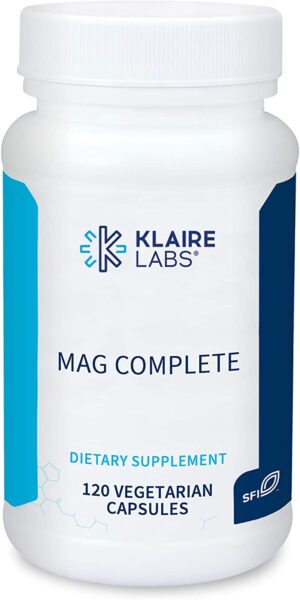
Product Highlights
- Each serving provides 100 mg of magnesium (bisglycinate chelate and magnesium oxide)
- Magnesium and amino acid combination claimed to enhance bioavailability
- Chelation process intended to prevent stomach discomfort
- Hypoallergenic supplement
- Formulated to promote sleep and reduce muscle cramps
Pros & Cons
Pros
- Many reports of improved sleep
- Users found it reduces muscle cramps and anxiety
- Typically well-tolerated by most
- Easy-to-swallow
Cons
- Magnesium oxide ingredient may cause GI issues
Bottom Line
Klaire Labs’ Magnesium Glycinate Complex delivers 100 milligrams of magnesium per serving, utilizing a combination of magnesium bisglycinate chelate and magnesium oxide, which creates a unique chelated compound. The chelation process is intended to improve bioavailability while reducing potential stomach discomfort. The supplement is hypoallergenic and formulated to promote better sleep and reduce muscle cramps, which most users seem to experience.
Is taking more than one form of magnesium best? According to Klaire Labs, “a blend of four bioavailable forms of magnesium allows your body to optimally absorb and use this vital mineral.” But you know how we roll at GGR, so let’s dig into the data.
Klaire Labs Mag Complete provides 240 milligrams of magnesium sourced from four different forms of magnesium: magnesium succinate, magnesium taurinate (also referred to as magnesium taurate or acetyl taurate), magnesium malate, and magnesium aspartate.
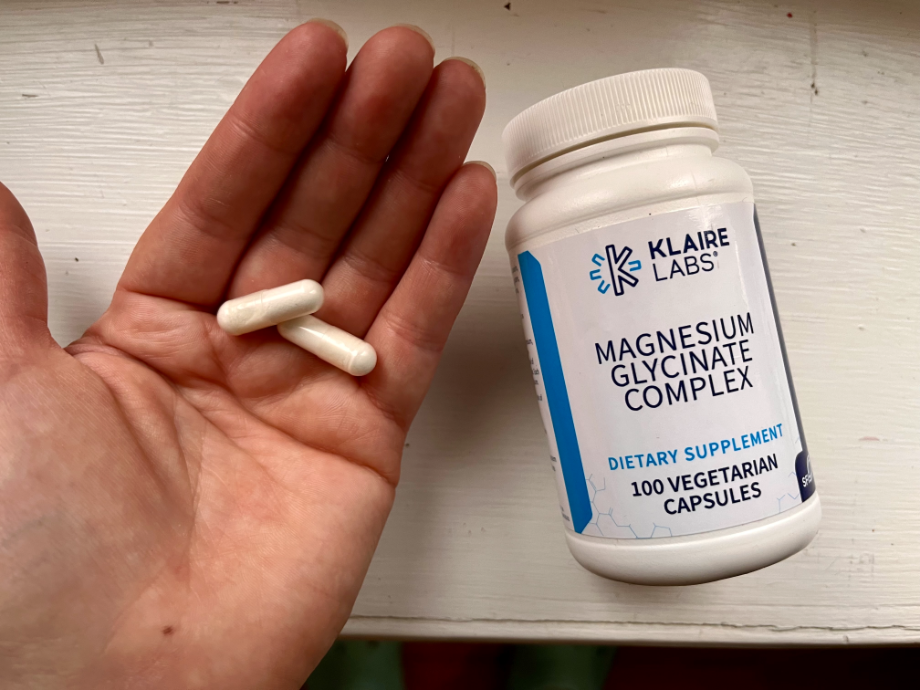
A 2019 study15 suggests magnesium acetyl taurate and malate forms have higher absorbability than magnesium citrate and oxide, while magnesium aspartate shows to compensate for deficiency more effectively and faster than 10+ other forms according to 2010 data.16 However, it’s important to note that the results are based on animal studies, and more human studies should be conducted.
Interestingly, GGR staff writer Lauren Strong found that Mag Complete gave her trouble sleeping. “It was noticeable that I wasn’t falling asleep as easily as I do with other magnesium blends.” And while this is not the common side effect, we thought we should call it out.
| Type | Capsules |
| Form of magnesium | Magnesium succinate, magnesium taurinate, magnesium malate, magnesium aspartate |
| Magnesium per serving | 240 mg (57% DV) |
| Dosing instructions | Take 2 capsules, 2 times daily with food |
| Cost | $23.90/60 servings = $0.40/serving |
Best Gummy Magnesium Supplement: Trace Minerals Magnesium Gummy
Good for: Kids and adults alike who prefer chewable nutrients beyond their food
Best Gummy
Trace Minerals Magnesium Gummy
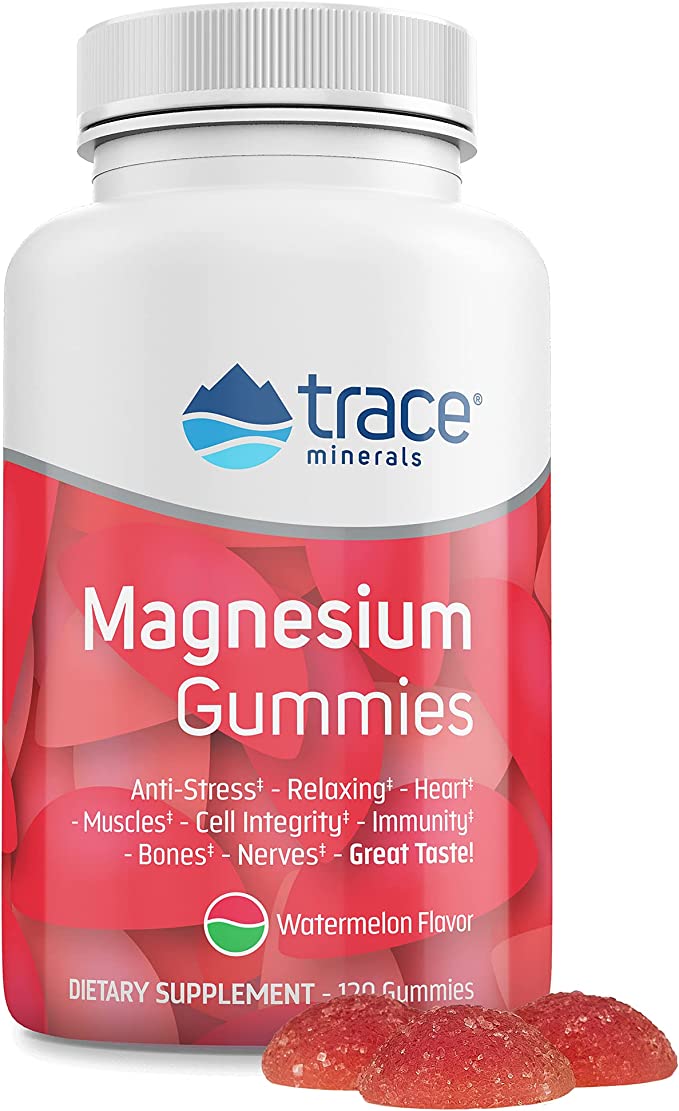
Product Highlights
- Watermelon or tangerine-flavored gummies
- Each serving provides 84 mg of magnesium citrate
- Formulated to enhance mood, focus, energy, and gut health
- Claimed to relieve muscle cramps
- 100% organic ingredients
Pros & Cons
Pros
- Most consumers enjoy the taste
- Organic ingredients
- Can be taken by children or adults
- 3rd-party tested for purity and potency
Cons
- Too sweet for some; has added sugar
- Only 20% of daily recommended magnesium
Bottom Line
If you prefer chewables over capsules, Trace Minerals’ Magnesium Gummies come in either watermelon or tangerine flavor, each of which contains 84 milligrams of magnesium citrate. According to Trace Minerals, these 100% organic gummies are formulated to improve mood, focus, energy, and gut health, while also relieving muscle cramps. Although the majority of reviewers appreciated the taste, some found it too sugary and sweet.
You should ideally bite into magnesium-rich foods—like leafy greens, nuts, seeds, and whole grains—on a daily basis. But Trace Minerals Magnesium Gummies can conveniently supplement your magnesium intake in just a few chews.
One gummy serving provides 84 milligrams of magnesium citrate to support a healthy mood, energy levels, and mental focus. The small dose in each gummy makes them suitable for children and Trace Minerals recommends kids aged 4 to 12 years to chew 1 gummy per day. Anyone aged 13 and older can chew 1 gummy up to 4 times daily spread throughout the day to mitigate the laxative effect of magnesium citrate.
Like most gummy supplements, all three flavors—Peach, Tangerine, and Watermelon—contain added sugars sourced from organic cane sugar and organic tapioca syrup. But unlike most gummies, these are gelatin-free, making them a great option for a vegan diet.
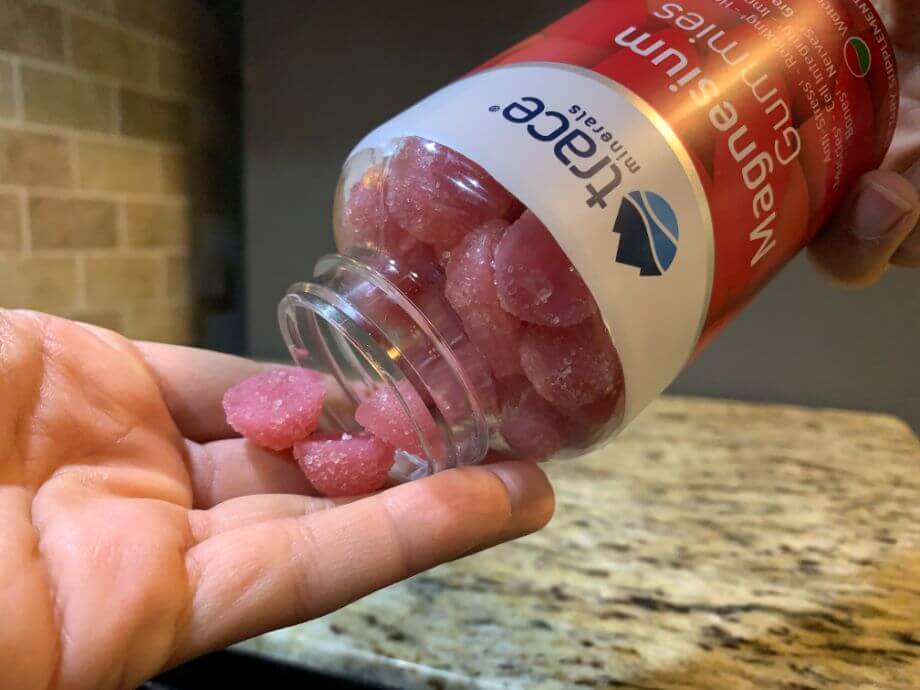
GGR head of content Kate Meier tried these gummies, and she said not only are they delicious, they work, too. “I take four at a time; they provide a very calming effect and help me sleep. I have wild dreams, too!”
Speaking of, Trace Minerals Magnesium Gummies are Certified Vegan and also free of gluten and GMOs. While no identifiable logo indicates additional third-party testing, Trace Minerals claims its “rigorous standards and certifications from manufacturing to packaging guarantee clean, trustworthy products.”
| Type | Gummies |
| Form of magnesium | Magnesium citrate |
| Magnesium per serving | 84 mg (20% DV) |
| Dosing instructions | Children ages 4 to 12, chew 1 gummy per day; for ages 13 and older, chew 1 gummy up to 4 times daily alone or at mealtime |
| Cost | $19.99/120 servings = $0.17/serving |
Best Magnesium Supplement for Stress: Natural Vitality Calm
Good for: Combatting day-to-day stress one sip of magnesium at a time
Best for Stress
Natural Vitality Calm
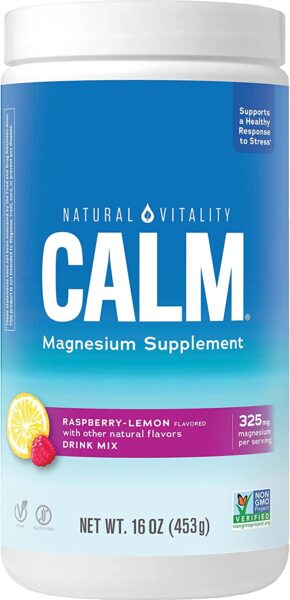
Product Highlights
- Formulated with 330 mg of magnesium citrate per serving
- Designed to reduce stress and improve sleep and energy
- Claimed to be better absorbed than other forms of magnesium
- May be taken by both children and adults
- Orange-flavored gummies
- Vegan- and non-GMO–verified
Pros & Cons
Pros
- Comparably affordable
- For both adults or kids
- Users report a good taste
- Reportedly effective in promoting sleep and decreased stress
- No artificial flavoring or color
Cons
- Some reports of customers receiving a damaged product
- Contains sugar
Bottom Line
Natural Vitality’s Calm gummies provide 330 milligrams of magnesium citrate per serving, which is claimed to be better absorbed by the body than other forms of magnesium. Formulated to help reduce stress and improve sleep and energy, these gummies may be taken by adults or children. While most users appreciate the orange and raspberry lemon taste, these gummies do contain sugar and may be too sweet for some user’s preferences.
Breathe in, breathe out… Sip Natural Vitality Calm, and mellow out. If you’re seeing this Natural Vitality, new slogan? And if you’re seeing this in hopes of managing stress, Natural Calm might be your newest supplement stack addition.
The calming magnesium powder provides 350 milligrams of magnesium carbonate in a 2-tablespoon serving size. Magnesium carbonate is joined with citric acid, so when they’re added to water, it forms magnesium citrate—but does it really ease stress?
Based on a 2017 review1, emotional stress—whether related to excitement, anxiety, or depression—increases the need for magnesium. This is likely because magnesium converts tryptophan to serotonin, a neurotransmitter majorly linked to mental health and mood. Complementary evidence published in Nutritional Neuroscience17 suggests magnesium supplementation may prevent depression and be an adjunctive therapy.
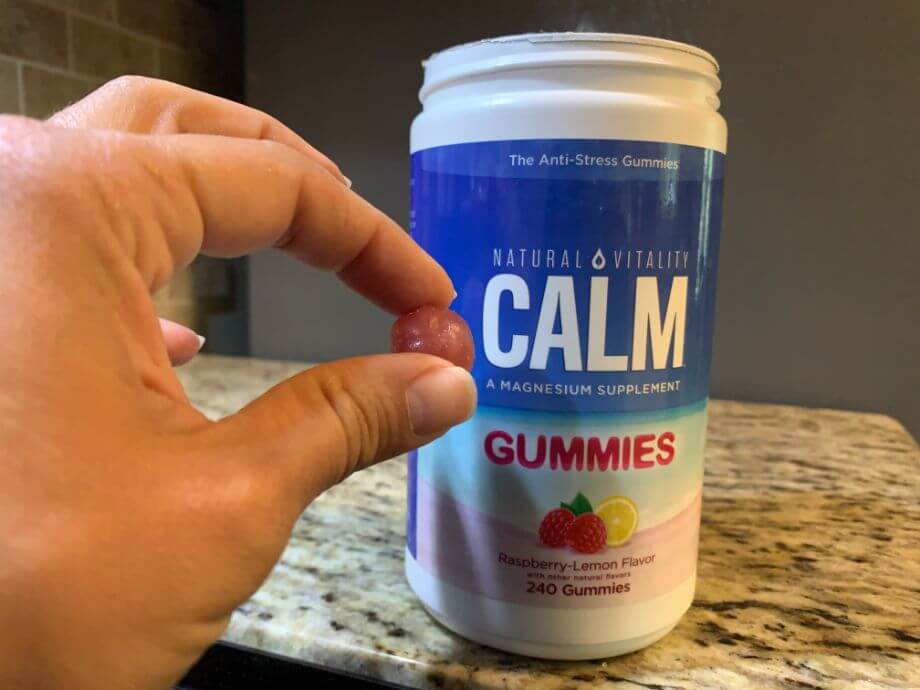
The magnesium-calming drink comes in its original, unflavored option and five flavors—Cherry, Lemon, Orange, Raspberry Lemon, and Watermelon—all free of added sugar, fructose, and artificial colors and flavors.
“I have taken Natural Calm, either as a powder or as gummies, on and off for years,” says GGR head of content Kate Meier. “I love it. I always sleep better when I take it (and it always gives me dreams that are totally bananas!). I started off just taking two at a time, and now I take four gummies.”
| Type | Drink Mix (5 flavor options) |
| Form of magnesium | magnesium carbonate |
| Magnesium per serving | 350 mg (83% DV) |
| Dosing instructions | Add 2 tsp to 2-3 oz water, let it fizz, then stir and enjoy |
| Cost | $22.77/113 servings = $0.20/serving (for Original on Amazon) |
Other Magnesium Supplements We Researched
While we stand by our top picks, we also researched these other magnesium supplements, which we haven’t had a chance to try yet:
- Live Conscious Magwell Magnesium Zinc & Vitamin D3
- MegaFood Magnesium
- Nested Magnesium Glycinate
- Pure Encapsulations Magnesium Citrate
How We Picked and Tested the Best Magnesium Supplements
Wanna get in on a little secret? When picking and testing the best magnesium supplements, our team of registered dietitians and licensed nutrition experts use our supplement testing methodology to look at things like:
- Magnesium form: Beyond satisfying your daily magnesium needs, different types of magnesium supplements elicit different benefits. Whether your focus is relieving constipation, improving sleep, or enhancing brain health, our list of magnesium supplements is diverse to satisfy the various needs of our readers.
- Formulation: What’s inside each supplement matters most, so we captured magnesium products formulated with high-quality ingredients and without artificial ingredients, fillers, and preservatives.
- Third-party testing: Finding products that comply with Good Manufacturing Practices (GMPs) and undergo third-party testing is at the top of our priority list.
- Cost: Because everyone’s budget varies, and we believe everyone should have access to supplements and products to optimize their health, you’ll always find different price options on our roundups.
- Consumer satisfaction: We want to guide our readers to companies with their best interests in mind, so we always review their core values, return policies, and customer reviews on the companies’ websites and third-party seller sites like Amazon.
Benefits of Magnesium Supplements
Active in over 300 processes in the body, the health benefits of magnesium follow suit. Here’s how magnesium supplements could enhance your health for the better:1
- May improve athletic and muscle performance and help alleviate muscle cramps that may inhibit performance
- Can help control blood sugar levels in healthy individuals and those managing type 1 diabetes21 and type 2 diabetes22
- Supports bone health and lowers the risk of osteoporosis, which makes sense given 53% of magnesium reserves are in bone
- Relieves constipation, particularly with the help of magnesium citrate and oxide forms
- Prevents and manages migraines, even showing to be as effective as medications13
- Promotes a good night’s rest and improves sleep efficiency, time, and onset7
- Supports cardiovascular health by reducing high blood pressure and atrial fibrillation, irregular heartbeats
- Bolsters mental health by preventing depression, improving mood, and alleviating stress
- Enhances cognition, especially learning and memory function18
- Offers nutritional insurance and convenience if/when magnesium-rich food sources are not readily available
Dosing and Interactions
While magnesium supplements are mostly considered safe, you should still dose them accordingly. Magnesium can also interact with certain medications and supplements, posing serious risks and reducing effectiveness.
Dosing Magnesium
While there’s no standardized magnesium supplement dose, the tolerable upper limit of magnesium supplementation is 350 milligrams per day without side effects. However, higher levels can be used as indicated, but consuming too much magnesium can lead to digestive diarrhea, muscle weakness, and other adverse side effects.1
As a starting point, it’s wise to understand how much magnesium you need each day. Provided by the NIH, the RDAs (or the average daily intake to meet nutrient requirements) below indicate the amount of magnesium to consume based on life stage.
| Age | Male | Female | Pregnancy | Lactation |
| Birth to 6 months* | 30 mg | 30 mg | ||
| 7-12 months | 75 mg | 75 mg | ||
| 1-3 years | 80 mg | 80 mg | ||
| 4-8 years | 130 mg | 130 mg | ||
| 9-13 years | 240 mg | 240 mg | ||
| 14-18 years | 410 mg | 360 mg | 400 mg | 360 mg |
| 19-30 years | 400 mg | 310 mg | 350 mg | 310 mg |
| 31-50 years | 420 mg | 320 mg | 360 mg | 320 mg |
| 51+ years | 420 mg | 320 mg |
*Recommendation based on Adequate Intake (AI)
Magnesium Interactions
Did you know certain nutrients can interfere with how other supplements and medications work in the body? This can downplay anticipated results and even be really dangerous in some instances. The NIH tells us that magnesium supplements can interact or interfere with some medicines and supplements, including:
- Antibiotics
- Bisphosphonates
- Diuretics
- Proton pump inhibitors
- Zinc supplements
But before taking any sort of supplement, we always recommend consulting with a dietitian, doctor, or another healthcare professional. They can help you determine a dose of magnesium right for you, especially if you have high or low levels of magnesium, and review any interaction risks.
Third-Party Testing
Did you know that dietary supplements aren’t tightly regulated by the Food and Drug Administration (FDA)? This is why we always prioritize companies who voluntarily have their products third-party tested to verify purity and safety. Reputable, third-party testing stamps to look out for include:
- Informed Sport
- National Sanitation Foundation (NSF)
- US Pharmacopeia (USP) Verification
The FDA does, however, establish Good Manufacturing Practices (GMPs) regulations for quality assurance that we recommend looking out for. Products can also be certified to help consumers make well-informed decisions related to specific dietary restrictions and preferences, like being Certified Gluten-Free or USDA Organic.
Buying Guide: What to Look for in Magnesium Supplements
Before committing to and starting a magnesium supplement, make sure you check off these boxes to find one that best supports your nutritional needs and goals:
- Intended use: Consider if there’s a specific use for taking a magnesium supplement beyond supporting your daily magnesium intake. For instance, magnesium citrate is best known for managing constipation, while magnesium L-threonate might support cognition.19
- Magnesium dose: If you’re already taking a multivitamin and regularly consuming magnesium-rich foods, you might start with a lower dose. But again, consult with a dietitian or another healthcare professional for expert guidance on how much supplemental magnesium you need.
- Dietary restrictions and preferences: Choose a product that factors your dietary restrictions and preferences, like being vegan or gluten-free.
- Intake form: Do you prefer gummies, capsules, or powders? Are you okay with taking larger doses multiple times daily or do you want a one-and-done product? These are important factors to consider so you’ll be more apt to take the supplement consistently.
- Budget: Factor in how much you’re willing to spend on a supplement, especially for long-term use if or as needed.
- Third-party testing: Opt for third-party tested products manufactured in GMP-compliant facilities as often as possible.
Magnesium Supplements FAQs
What is the most effective form of magnesium supplement?
The NIH mentions some forms of magnesium—like magnesium in the aspartate, citrate, and chloride forms—are better absorbed than magnesium oxide and magnesium sulfate.
However, a 2021 meta-analysis23 suggests that all magnesium supplements can maintain physiological levels in healthy individuals.
Moreover, each form of magnesium offers different benefits, so it’s best to take the one that supports your health goals and needs. For instance, magnesium citrate shows to be the most effective for managing constipation due to its laxative effects, while magnesium L-threonate may benefit brain health more.
Is it better to take magnesium citrate or magnesium glycinate?
Because magnesium citrate and magnesium glycinate appear well-absorbed but offer different health benefits, it’s best to take the one that addresses your needs. Magnesium citrate is more effective for managing constipation due to its laxative effects, whereas magnesium glycinate may be best for promoting general health and wellness.
Which magnesium is safe to take daily?
All forms of magnesium appear safe, although magnesium citrate and oxide are known to cause digestive distress. Dosing according to the product’s instructions and, ideally, under medical guidance is also essential.
What type of magnesium is best for weight loss?
Although a 2021 meta-analysis24 suggests magnesium supplementation may reduce body mass index (BMI), there’s no definitive type best for weight loss. Magnesium supplements should be used to ensure adequate intake of the mineral rather than a weight loss aid.
Is it better to take magnesium supplements in the morning or at night?
The answer, as always, is it depends, and also the time of day isn’t as important as taking it on a consistent basis. If you’re more likely to remember to take your supplement in the morning then do it then, but if it’s easier for you at night then there’s no problem with that.
These statements have not been evaluated by the Food and Drug Administration. This product is not intended to diagnose, treat, cure, or prevent any diseases.
References
- Schwalfenberg GK, Genuis SJ. The Importance of Magnesium in Clinical Healthcare. Scientifica (Cairo). 2017;2017:4179326. doi:10.1155/2017/4179326
- Ahmed F, Mohammed A. Magnesium: The Forgotten Electrolyte-A Review on Hypomagnesemia. Med Sci (Basel). 2019;7(4):56. Published 2019 Apr 4. doi:10.3390/medsci7040056
- Brilli E, Khadge S, Fabiano A, et al. Magnesium bioavailability after administration of sucrosomial® magnesium: results of an ex-vivo study and a comparative, double-blinded, cross-over study in healthy subjects. Eur Rev Med Pharmacol Sci. 2018 Mar;22(6):1843-1851. doi: 10.26355/eurrev_201803_14605. PMID: 29630135.
- Heffernan SM, Horner K, De Vito G, et al. The Role of Mineral and Trace Element Supplementation in Exercise and Athletic Performance: A Systematic Review. Nutrients. 2019 Mar 24;11(3):696. doi: 10.3390/nu11030696. PMID: 30909645; PMCID: PMC6471179.
- Veronese N, Berton L, Carraro S, et al. Effect of oral magnesium supplementation on physical performance in healthy elderly women involved in a weekly exercise program: a randomized controlled trial. Am J Clin Nutr. 2014;100(3):974-981. doi:https://doi.org/10.3945/ajcn.113.080168
- Zhang Y, Xun P, Wang R, et al. Can Magnesium Enhance Exercise Performance?. Nutrients. 2017;9(9):946. Published 2017 Aug 28. doi:10.3390/nu9090946
- Abbasi B, Kimiagar M, Sadeghniiat K, et al. The effect of magnesium supplementation on primary insomnia in elderly: A double-blind placebo-controlled clinical trial. J Res Med Sci. 2012 Dec;17(12):1161-9. PMID: 23853635; PMCID: PMC3703169.
- Hepsomali P, Groeger JA, Nishihira J, et al. Effects of Oral Gamma-Aminobutyric Acid (GABA) Administration on Stress and Sleep in Humans: A Systematic Review. Front Neurosci. 2020;14:923. Published 2020 Sep 17. doi:10.3389/fnins.2020.00923
- Rao TP, Ozeki M, Juneja LR. In Search of a Safe Natural Sleep Aid. J Am Coll Nutr. 2015;34(5):436-47. doi: 10.1080/07315724.2014.926153. Epub 2015 Mar 11. PMID: 25759004.
- Yang L, Chen X, Gao Y. Efficacy of Different Concentrations of Withanolides in Ashwagandha Supplements for Insomnia and Enhancing Energy Level. Curr Dev Nutr. 2022;6(Suppl 1):881. Published 2022 Jun 14. doi:10.1093/cdn/nzac067.001
- Lindberg JS, Zobitz MM, Poindexter JR, Pak CY. Magnesium bioavailability from magnesium citrate and magnesium oxide. J Am Coll Nutr. 1990 Feb;9(1):48-55. doi: 10.1080/07315724.1990.10720349. PMID: 2407766.
- Kappeler D, Heimbeck I, Herpich C, et al. Higher bioavailability of magnesium citrate as compared to magnesium oxide shown by evaluation of urinary excretion and serum levels after single-dose administration in a randomized cross-over study. BMC Nutr. 2017;3(1). doi:https://doi.org/10.1186/s40795-016-0121-3
- Karimi N, Razian A, Heidari M. The efficacy of magnesium oxide and sodium valproate in prevention of migraine headache: a randomized, controlled, double-blind, crossover study. Acta Neurol Belg. 2021 Feb;121(1):167-173. doi: 10.1007/s13760-019-01101-x. Epub 2019 Feb 23. PMID: 30798472.
- Rahman M, Nguyen H. Valproic Acid. [Updated 2022 Jul 4]. In: StatPearls [Internet]. Treasure Island (FL): StatPearls Publishing; 2023 Jan-. Available from: https://www.ncbi.nlm.nih.gov/books/NBK559112/
- Uysal N, Kizildag S, Yuce Z, et al. Timeline (Bioavailability) of Magnesium Compounds in Hours: Which Magnesium Compound Works Best? Biol Trace Elem Res. 2019 Jan;187(1):128-136. doi: 10.1007/s12011-018-1351-9. Epub 2018 Apr 21. PMID: 29679349.
- Spasov AA, Petrov VI, Iezhitsa IN, et al. [Comparative study of magnesium salts bioavailability in rats fed a magnesium-deficient diet]. Vestn Ross Akad Med Nauk. 2010;(2):29-37. Russian. PMID: 20364677.
- Derom ML, Sayón-Orea C, Martínez-Ortega JM, et al. Magnesium and depression: a systematic review. Nutr Neurosci. 2013 Sep;16(5):191-206. doi: 10.1179/1476830512Y.0000000044. Epub 2012 Dec 6. PMID: 23321048.
- Slutsky I, Abumaria N, Wu LJ, et al. Enhancement of learning and memory by elevating brain magnesium. Neuron. 2010 Jan 28;65(2):165-77. doi: 10.1016/j.neuron.2009.12.026. PMID: 20152124.
- Sadir S, Tabassum S, Emad S, et al. Neurobehavioral and biochemical effects of magnesium chloride (MgCl2), magnesium sulphate (MgSO4) and magnesium-L-threonate (MgT) supplementation in rats: A dose dependent comparative study. Pak J Pharm Sci. 2019 Jan;32(1(Supplementary)):277-283. PMID: 30829204.
- Zhang C, Hu Q, Li S, et al. A Magtein®, Magnesium L-Threonate, -Based Formula Improves Brain Cognitive Functions in Healthy Chinese Adults. Nutrients. 2022;14(24):5235. doi:https://doi.org/10.3390/nu14245235
- Lin CC, Huang YL. Chromium, zinc and magnesium status in type 1 diabetes. Curr Opin Clin Nutr Metab Care. 2015 Nov;18(6):588-92. doi: 10.1097/MCO.0000000000000225. PMID: 26406393.
- Piuri G, Zocchi M, Della Porta M, et al. Magnesium in Obesity, Metabolic Syndrome, and Type 2 Diabetes. Nutrients. 2021 Jan 22;13(2):320. doi: 10.3390/nu13020320. PMID: 33499378; PMCID: PMC7912442.
- Pardo MR, Garicano Vilar E, San Mauro Martín I, Camina Martín MA. Bioavailability of magnesium food supplements: A systematic review. Nutrition. 2021 Sep;89:111294. doi: 10.1016/j.nut.2021.111294. Epub 2021 Apr 28. PMID: 34111673.
- Askari M, Mozaffari H, Jafari A, et al. The effects of magnesium supplementation on obesity measures in adults: a systematic review and dose-response meta-analysis of randomized controlled trials. Crit Rev Food Sci Nutr. 2021;61(17):2921-2937. doi: 10.1080/10408398.2020.1790498. Epub 2020 Jul 11. PMID: 32654500
Further reading

Get your heart rate up, improve your cardio fitness, and sweat through these three rowing interval workouts. Read more

This unique protein contains fruits, veggies, and probiotics, but how does it taste? Find out in our Purely Inspired Organic Protein review. Read more

n our HelloFresh Review, we use insights from a product tester and a registered dietitian to get a full picture of this popular meal delivery service. Read more

Is walking backwards good for you? We have some surprising health benefits that might shock you. Read more
